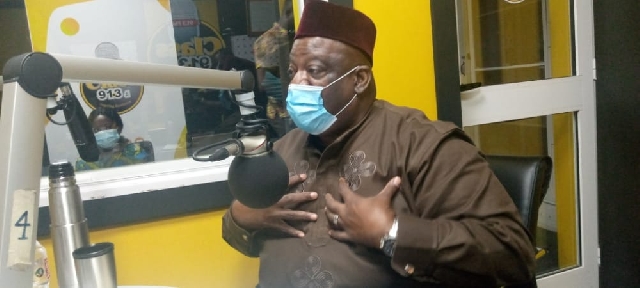Featured
COVID-19: “We put a lot more people at risk by boardinising students” – Joe Jackson
Published
6 years agoon

Dalex Finance COO, Mr Joe Jackson, has said keeping senior high school students in boarding houses in this COVID-19 era is helping the community spread of the virus.
Within the past few days, nine students of Mpraeso Senior High School in the Kwahu South District of the Eastern Region have been isolated over COVID-19 fears.
The school is awaiting results of tests conducted on the students as they receive medical attention and management.
It follows the confirmation of eight cases at Accra Girls’ Senior High School which threw the student body and parents into pandemonium.
Subsequently, there have been reports of COVID-19 scares in other senior high schools across the country, just about a month after the President directed that they be opened for final-year students to go sit their exams.
A few days ago, a final-year student of KNUST SHS in Kumasi died on campus after bouts of vomiting and stomach issues.
The school authorities, according to the students, neglected their colleague out of fear of contracting COVID-19.
Speaking on Class91.3FM’s Executive Breakfast Show on Thursday, 9 July 2020 about the reopening of senior and junior high schools for final-year students vis-à-vis reports of community spread of the COVID-19 pandemic in SHSs, Mr Jackson said: “On one hand, we are clear in our minds that COVID-19 is here to stay. On the other hand, we are also clear in our minds that … our overcrowded schools, our overcrowded dormitories etc., were not going to be safe for these kids”.
“What we’ve done is run an experiment and there were several social psychologists who said: ‘These kids are not and will keep to social-distancing [protocols] when they get there’. And you asked a very important question: ‘At what point do we decide?’ And it is disingenuous to tell me that if they go back [home], they are not safe. Each of us is safe in his home and so long as we stay in our homes and we flatten the curve until we get it under control”.
“By going back to school, take full responsibility for the effect …”, he said, adding: “At this moment, there are indications that the kids are getting ill, yes, they brought it from home, but the danger is: how many people they have spread it to in the conditions they are in? If I’m in my house and I get infected, the spread is limited to my immediate circle”.
“If you go to school with 300, 400 people and more and you’re infected in those conditions that we’ve seen, then the spread would be much worse when they go back into their communities”, Mr Jackson pointed out, adding: “So, let us accept that an experiment was made, nobody is saying we shouldn’t learn to live with COVID-19; it may even require some dramatic changes to the model of education”.
He said the current situation calls for some drastic decisions to be taken.
“We may even decide that boarding schools will not work under these circumstances, so, everybody should become a day student. They are not easy decisions but I’m saying that by asking the children to go to school under the circumstances of living in a boarding house when we already knew that community spread was available, all we did was to put a lot more people at risk”.
Mr Jackson also said there was the need for clear risk modelling within which timely decisions could be taken to mitigate further spread of the virus among students.
“You have to accept responsibility for that. And it’s a legitimate question to ask you: At what point in our modelling of this thing, do we say the risk was OK? Or at what point do we say: This went badly, let’s step back. Because the arguments being presented don’t give us a model for us to operate with”.
To him, the authorities should not hesitate to back-track as other countries which reopened schools later did.
“And we’ve seen other scenarios where people have stepped back and said: ‘We tried this experiment, it didn’t work’, and it’s fine; we are all in a period of radical uncertainty, so, it’s OK, but you have to accept responsibility”, he said, noting: “We have to say that a lot of people said before you opened the schools that: ‘This sounds like a bad move because putting kids together in the boarding situations we have, it was a disaster waiting to happen’”.
“All the guys [other countries] who have gone to school, they have not done boarding. What was critical in our reopening was the boarding schools and how difficult it was going to be to keep these kids safe under boarding conditions. If these kids were all day students, we may be talking a different argument here”, he stressed.
“It’s about limiting exposure” to the virus, he emphasised.
Meanwhile, COVID-19 infections in Africa today surpassed 500, 000, and there are concerns as a growing number of countries are experiencing a sharp rise in cases, the World Health Organization (WHO), has said.
It noted that, so far, in less than five months, the virus has claimed 11, 959 lives on the continent, overtaking the 11, 308 lives lost in the world’s worst Ebola outbreak in West Africa between 2014 and 2016.
Cases have more than doubled in 22 countries in the region over the past month.
Nearly two-thirds of countries are experiencing community transmission.
Algeria, Egypt, Ghana, Nigeria and South Africa account for about 71% of COVID-19 cases.
South Africa alone accounts for 43% of the continent’s total cases.
However, the accelerating growth trend is not uniform across the continent, with some countries recording a steady rise in cases, indicating a protracted pandemic.
Eritrea, The Gambia, Mali, Seychelles and Togo are witnessing long doubling times and low growth rates.
Seychelles had not experienced a case in nearly two months, but in the past week, had dozens of new imported cases, linked to crew members of an international fishing vessel.
There are also some signs of progress as 10 countries have experienced a downward trend over the past month.
Although Egypt accounts for 15 per cent of cumulative cases, it has seen a decline in the past week.
“With more than a third of countries in Africa doubling their cases over the past month, the threat of COVID-19 overwhelming fragile health systems on the continent is escalating,” said Dr Matshidiso Moeti, World Health Organization (WHO) Director for Africa.
“So far, the continent has avoided disaster and if countries continue to strengthen key public health measures such as testing, tracing contacts and isolating cases, we can slow down the spread of the virus to a manageable level.”
Eighty-eight per cent of COVID-19 infections are among people aged 60 and below, likely due to Africa’s relatively young population.
However, the likelihood of dying from COVID-19 rises with increasing age and the existence of co-morbidities, with the risk of death among patients aged 60 years and above being 10 times higher compared with those below 60.
“Communities across the continent have a crucial role to play in controlling the pandemic, especially as countries begin easing lockdowns and opening up their borders,” said Dr Ahmed Al-Mandhari, WHO Director for the Eastern Mediterranean.
“As governments continue to implement public health measures, individuals must remain as cautious and vigilant as ever to protect themselves, their families, and their communities. Hand washing, mask use, physical distancing and other preventative measures are key to controlling transmission, saving lives, and ensuring that already overwhelmed health systems are not stretched to breaking point.”
As COVID-19 continues to spread, thousands of health workers have also fallen ill.
Equipping and protecting health workers is one of the central pillars of the COVID-19 response.
WHO is working to support countries respond to COVID-19 by providing technical guidance, crucial medical equipment and has remotely trained more than 25 000 health workers. WHO has also organised more than 420 shipments of key equipment, including more than 3000 oxygen concentrators, 23 000 GeneXpert diagnostic testing machines and almost 4 million pieces of personal protective equipment for health care workers.
Source: Classfmonline.com

